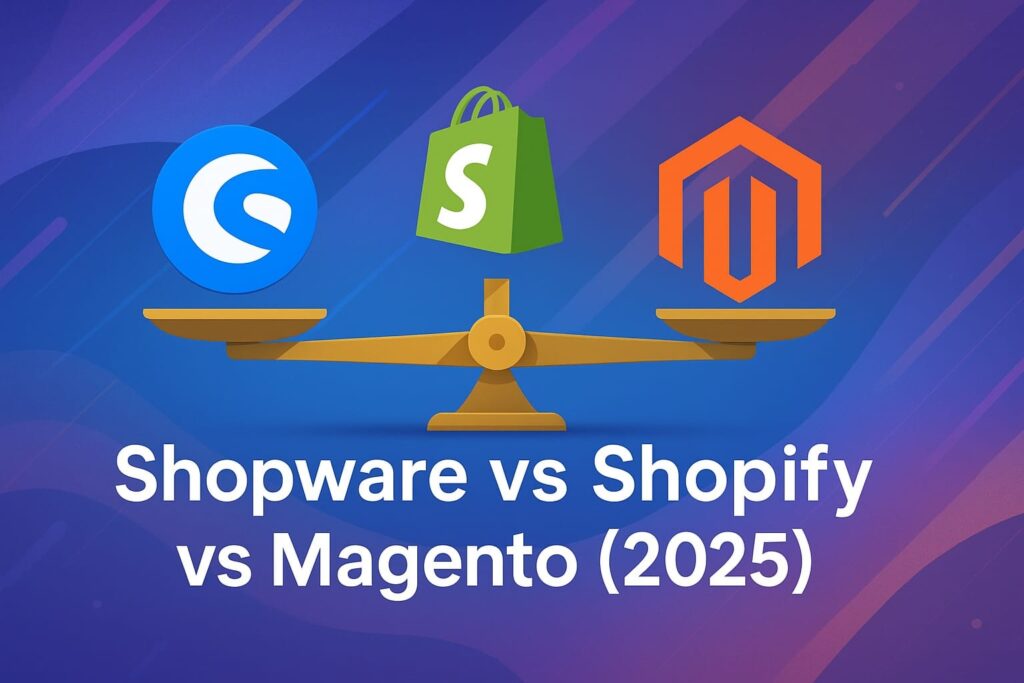Introduction
Choosing the right eCommerce platform is critical to your online store’s success. In 2025, Shopware, Shopify, and Magento remain three of the most popular solutions—each with its own strengths, pricing models, and ecosystems. This guide will help you weigh features, cost, scalability, performance, and more, so you can pick the best fit for your business.
1. Platform Overview
| Aspect | Shopware | Shopify | Magento (Adobe Commerce) |
|---|---|---|---|
| Origin | Germany (open-source core) | Canada (hosted SaaS) | USA (open-source, now Adobe) |
| Deployment | Self-hosted or Cloud Edition | Fully hosted | Self-hosted or Adobe cloud |
| Pricing (starting) | Free Community Edition; Cloud €29/mo | Basic $39/mo; Advanced $399/mo | Open-source free; Commerce from $2,000/mo |
| Target Users | Mid-market to enterprise | Small to mid-market (non-technical) | Mid-market to enterprise (technical teams) |
2. Ease of Use & Setup
-
Shopify
- Onboarding: Guided, intuitive setup wizard
- Hosting & Maintenance: Fully managed; zero server upkeep
- Learning Curve: Minimal—ideal for non-technical merchants
-
Shopware
- Onboarding: Installer for Cloud Edition; CLI setup for self-hosted
- Hosting & Maintenance: You choose provider or use Shopware Cloud
- Learning Curve: Moderate—some developer involvement
-
Magento
- Onboarding: Requires server config, Composer, CLI commands
- Hosting & Maintenance: Self-hosted or Adobe Cloud; technical ops needed
- Learning Curve: Steep—best for experienced developers
3. Feature Comparison
| Feature | Shopware | Shopify | Magento |
|---|---|---|---|
| Product Variants | Up to 100 per product | Up to 100 variants per product | Unlimited |
| Multi-store support | Yes | Yes (through Plus plan) | Yes |
| Payment gateways | 100+ via plugins | 100+ built-in | 150+ via extensions |
| Headless/API readiness | GraphQL & REST APIs | Storefront API (GraphQL) | GraphQL & REST APIs |
| B2B functionality | Native B2B module | Apps / custom dev | Native (Magento Commerce) |
| SEO tools | Built-in SEO module | Built-in meta tags & sitemaps | Advanced control via extensions |
4. Pricing & Total Cost of Ownership
-
Shopify
- Basic: $39/mo
- Shopify: $105/mo
- Advanced: $399/mo
- Transaction Fees: 2.9% + $0.30 (Basic), lower on higher plans
-
Shopware
- Community Edition: Free (self-hosted)
- Professional Cloud: €29/mo
- Enterprise Cloud: Custom pricing
- Hosting: Varies by provider (e.g., €15–€100+/mo)
-
Magento
- Open Source: Free (self-hosted)
- Adobe Commerce: Starts ~$2,000/mo + hosting
- Development Costs: Higher due to complexity
Tip: Always factor in development, maintenance, extensions/apps, and payment fees when comparing total cost.
5. Scalability & Performance
-
Shopify
- Auto-scales with traffic surges
- CDN & global edge network included
-
Shopware
- Scales on your hosting setup
- Enterprise Cloud offers auto-scaling & performance SLA
-
Magento
- Highly scalable if tuned correctly (Varnish, Redis, ElasticSearch)
- Enterprise Cloud includes staging, performance optimization
Performance Benchmark (2025)
| Load Test (1,000 SKUs) | Page Load (desktop) | Peak Concurrency |
|---|---|---|
| Shopify | ~1.2s | 5,000 users |
| Shopware Cloud | ~1.5s | 3,000 users |
| Magento Commerce | ~1.8s | 7,000 users |
6. Customization & Extensibility
-
Shopify
- Themes via Liquid templating
- App Store (6,000+ apps)
- Limited core code access
-
Shopware
- Twig-based templates
- Plugin system with extensive hooks/events
- Full code access on Community Edition
-
Magento
- PHP-based modular architecture
- Composer-driven modules
- Unlimited customization potential
7. Integrations & Ecosystem
-
Shopify:
- App ecosystem for marketing, shipping, analytics
- POS integration for brick-and-mortar
-
Shopware:
- Official connectors for PIM, ERP, marketplaces
- Growing plugin marketplace in Europe
-
Magento:
- Vast marketplace (Adobe Exchange)
- Native Adobe Experience Cloud integration
8. Security & Compliance
-
Shopify:
- PCI DSS Level 1 certified
- Automatic security patching
-
Shopware:
- ISO/IEC 27001 certified (Cloud)
- Regular security patches
-
Magento:
- PCI compliance relies on your hosting setup
- Security patches released quarterly
9. Support & Community
| Shopware | Shopify | Magento | |
|---|---|---|---|
| Official Support | 24/7 Enterprise support | 24/7 chat, email, phone | Enterprise support (paid plan) |
| Community Forums | Active German & global forums | Large community, Slack channels | Massive developer community |
| Documentation | Comprehensive Dev docs | Extensive guides & tutorials | Very detailed but can be complex |
10. Who Should Choose Which?
- Shopify – Best for fast-moving SMBs or entrepreneurs who need a fully managed, low-maintenance solution.
- Shopware – Ideal for European-focused merchants or mid-market businesses that want open-source flexibility without massive development overhead.
- Magento – Suited for large enterprises or highly unique stores requiring deep customization and full technical control.
Conclusion
In 2025, your choice hinges on budget, technical resources, and growth plans.
- Go with Shopify if you value simplicity and speed to market.
- Pick Shopware if you need a balance of open-source freedom and managed services.
- Choose Magento if you have the in-house expertise to leverage its unlimited customization.
Ultimately, test drive each platform—explore free trials or demos, and evaluate how they align with your long-term eCommerce vision.
